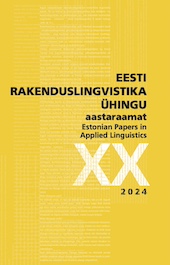Varase eesti keele kui teise keele õppemängude kasutusvõimalused ja valikud õpetajate hinnangul
Possibilities and selection of games for early Estonian as a second language learning according to teachers’ assessment
Author(s): Heily Leola, Krista Uibu, Aino UgasteSubject(s): Foreign languages learning, Language acquisition, Finno-Ugrian studies, School education, Sociology of Education
Published by: Eesti Rakenduslingvistika Ühing (ERÜ)
Keywords: eesti keele kui teise keele (E2) omandamine; varane keeleõpe; keeleõppemäng; koolieelse lasteasutuse õpetaja; eesti keel; acquisition of Estonian as a second language (E2); early language learning; la
Summary/Abstract: One way to acquire a language in an age-appropriate way is to use language-learning games. Previous studies have shown that there is a lack of suitable materials for language learning in preschools, including language-learning games, and teachers consciously do not choose games and rather focus on school-like learning. The transition to learning in Estonian requires the development of learning materials, including creating games that are suitable for learning Estonian as a second language. To support the learning of a second language, teachers must know how to choose games that consider the unique nature of language learning in preschools. The research aimed to determine how teachers assess the possibilities of using language-learning games for children and their selection criteria and principles. Fifty preschool teachers who had experience teaching children who speak Estonian as a second language were surveyed. The data were analyzed using mixed methods. The study revealed that the preschool teachers valued language-learning games as an opportunity to help children acquire a new vocabulary and culture while supporting children's interests and motivation. The teachers believed that language-learning games were not very useful in developing the general skills of children. When choosing language-learning games, the teachers rated most highly the criteria related to the substantive side of the games as, in their opinion, games should contain various exercises and tasks. The teachers proceeded from the principle that, in addition to developing language skills, the game should consider each child’s individuality and integrate other areas of learning into the language game. According to the teachers, games that take into account children's different language levels and interests and also help develop other areas of learning and educational activities are suitable for language learning.
Journal: Eesti Rakenduslingvistika Ühingu aastaraamat
- Issue Year: 2024
- Issue No: 20
- Page Range: 133-148
- Page Count: 16
- Language: Estonian

